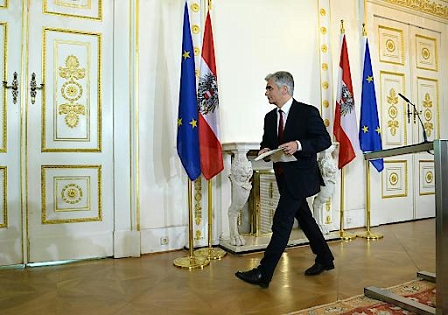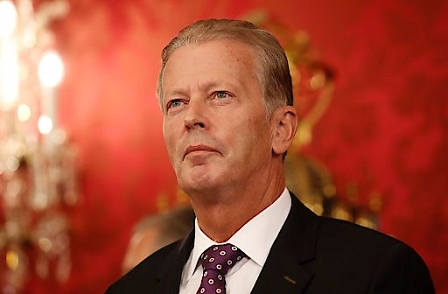Erstellt am: 9. 5. 2016 - 16:20 Uhr
Why the SPÖ is falling apart
FM4 Reality Check
Hear the programme in the FM4 Player or subscribe to the podcast and get the whole programme after the show
In today's Reality Check, political analyst, Reinhard Heinisch, got to grips with the implosion of the SPÖ and explained to Joanna Bostock why bigger is not necessarily better, if you're a political party. However, there is a formula for success, but the SPÖ seem not to have learned from the example of their European colleagues.
RH: We have examples in Europe of left wing parties, or centre left parties and centre conservative parties where they do well, and it is not a big secret what the ingredients are for them to do well. Even in Austria, we have some regional party leaders that are quite successful.

Creative Commons
JB: In that case, if there are examples of how it works and the winning formula is clear, so to speak, what is it about the Austrian SPÖ that makes them apparently incapable of seeing that and acting upon it. Is it the personalities involved?
RH: Well, to an extent. There was a very important article in political science written about 15 or 20 years ago, and the argument is roughly as follows: at one point there were mass parties. Mass parties then moved to the centre and became “catch all” parties. And eventually “catch all” parties become so connected with the state, that they actually maintain their presence by extracting resources from the state, by being reimbursed for election costs, bringing moving party officials into high public office, collecting party taxes... and the more they depend on the state, the less dependent they become on their voters and on their base. So, they don’t have to listen to their base, and they stop listening to their base, particularly at the federal level, or the national level.

APA/ROLAND SCHLAGER
It’s a different story at the local and regional level, because the units are simply smaller, but this is not just the problem of Austrian major parties, we’ve seen this in other countries, but it was an on-going detachment from the actual voters, where people at the national level, these are professional politicians that often speak a different language, have a different career track, and lose touch with the kinds of ideas people have, and they also find it difficult to communicate their ideas to voters. And that is a particular problem of major parties.
When we look at the right wing, populist parties, what makes them very often successful is not so much that they have these great, charismatic leaders that somehow bedazzle everybody. Many of these parties do not even have a very charismatic leader, but what they do is, they are very well organized. The first thing they do, is they develop an organization. They are present in the neighbourhoods, they have a stand somewhere , they talk to people at village fairs, at local markets, they interact. They are very visible, very present in the social media where they reach young people, and they are very traditional in their organizational model for other parts of the public. While we see with the major parties that they are pulling back, they are no longer as active, they are no longer as present in the media, they are much more laid-back and rely on the state to sort of prop them up and support them.
JB: And this is what’s happened in the SPÖ’s case?
RH: It is, to some extent what’s happening in the SPÖ. The SPÖ is not universally weak. It is weak in some parts, but it is still quite strong, for example, in Burgenland. We see that when the SPO lost elections, for example, in Western Austria, it used to be the number two party in all other Austrian states, even the so called “conservative states”. Once it lost its connection to the state there, they completely folded up there. They are basically non-existent, and then they have a very hard time to re-generate. We had this in Salzburg, where the party was essentially the governor’s party. Then they lost the elections, and it is hard to see now how the Social Democrats can make their way back. They often lack personnel, they haven’t kept up recruitment , they are not organized at and level of density outside the main city, so if you don’t have that organization structure, how are you going to organization again? Where are you going to take those resources from, once you’ve lost access to the government and those sort of resources.
It’s not surprising that the strongest parts of the Social Democrats are the trade unions, and the major cities, the major urban organisations. These are the only two areas where the Social Democrats still have a sizeable organisation: the unions are well organised, and the City of Vienna – there the Social Democrats are well organised. But when you move beyond that there is very little left of what used to make up a major Austrian party. And if you don’t have that you have no means of drawing strength again, once you want to rebuild your party.
So it’s not just a question of programmes and maybe new personalities, it’s also a question of organisation, and finding an organisation that allows you to talk to people, to be in touch with people at various levels.
JB: The SPÖ is not the only main party, there’s the ÖVP, which was also delivered a slap in the face in the presidential election, why are we not talking about a crisis in the ÖVP?
Well, the ÖVP has some strengths and some advantages that the Social Democrats do not have. First of the ÖVP’s greatest weakness is also one of its greatest strengths. Its greatest weakness is an organisational structure – the ÖVP has an extremely weak national centre, in fact there is really no national ÖVP because the party consists of five powerful leagues that are actually independent and could create their own parties.
Other than the chairman of the ÖVP and his secretary, there’s really no national party, so the national leadership is beholden to these other entities of the party. But these entities to some extent do provide the party with residual strength. So they’re strong in the states, and very strong in the countryside, still rooted in farming and agriculture. They’re also connected strongly to business, and they can recruit talent from business, a lot of business leaders could easily transition to take over a party branch or a regional chapter of the Austrian Conservatives.

AFP PHOTO / DIETER NAGL
That’s very different from the Social Democrats because apart from the trade unions, which are increasingly dominant, there are very few opportunities from where to recruit people with top leadership and management potential. In the past, previous social democratic chancellors usually came from those sorts of positions. A previous Chancellor [Franz Vranitzky] was a banker, another one [Viktor Klima] was a manager in the oil industry. You need somebody with this kind of experience in order to command a leadership position, and if you do not have that kind of reservoir, it is very difficult.
Weiterlesen
Politikberater Thomas Hofer über Konsequenzen und mögliche Neubesetzungen nach dem Rücktritt Faymanns.
The ÖVP has a much deeper roster of those kind of individuals, so their problem is much more of an organisational one. There is also rivalry between these different leagues [eg. Bauernbund, Wirtschaftsbund], so whenever they have to form a government or appoint ministers it’s always important for them to have the requisite number of people from the different leagues and regions of the country, and that weakens them because not all of these individuals are the most qualified. But in terms of the overall potential, it is easier, because the ÖVP is such a centrist party; it has different directions, it’s “brand” is to be in the middle, they don’t have those kinds of “wings” like the Social Democrats, who have to debate whether or not they’re for or against the Freedom Party. So the ÖVP are much more flexible to move in different directions without splitting the party
For the Social Democrats it would be a split, I mean there is real danger of the party breaking in two if the “right” wing of the Social Democrats were to move further to the right, the left might split off, or the other way around. That’s not going to happen with the People’s Party.
FM4 Reality Check
Monday to Friday from 12.00 to 14.00, Saturday from 12.00 to 13.00, and after the show via Podcast or fm4.orf.at/realitycheck.



